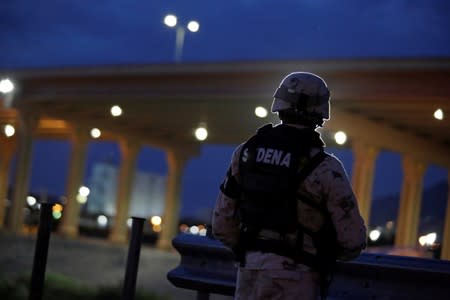ACLU files suit to block Trump rule to stop asylum-seekers
By Daniel Trotta
(Reuters) - The American Civil Liberties Union sued U.S. President Donald Trump's administration on Tuesday, challenging a sweeping new rule that would bar almost all migrants from seeking asylum at the southern border of the United States.
The new rule, announced on Monday and taking effect on Tuesday, marked Trump's latest crackdown on immigration, inspiring his supporters ahead of his 2020 re-election bid and pressuring Mexico and Central America to do more to stem the flow of migrants.
The ACLU and other groups say it violates U.S. and international law on several fronts, however.
"This is the Trump administration's most extreme run at an asylum ban yet. It clearly violates domestic and international law, and cannot stand," ACLU attorney Lee Gelernt said in a statement.
The lawsuit, filed in U.S. District Court for the Northern District of California, named Attorney General William Barr and a host of U.S. immigration officials as defendants.
Immigrant support groups East Bay Sanctuary Covenant, Al Otro Lado, Innovation Law Lab and Central American Resource Centre in Los Angeles were named as plaintiffs. The ACLU, the Southern Poverty Law Centre and the Centre for Constitutional Rights are representing them.
The new rule requires asylum-seekers to have first applied for asylum and been rejected in one of the countries they travelled through before becoming eligible to apply in the United States, shifting the burden to ill-equipped countries such as Mexico and Guatemala to process asylum claims.
SAFE THIRD COUNTRY
The suit argues that U.S. law establishes that an asylum-seeker can only be required to seek protection in another country under two conditions: when the United States has a "safe third country" agreement in place with that state, or when the asylum-seeker has firmly resettled in another country.
The United States is seeking "safe third country" agreements with Mexico and Guatemala, but they have resisted. And merely travelling through a country is insufficient to establish someone has firmly resettled there, the suit says.
As a result, the new rule would force people to return to countries "that are rife with danger and violence," the suit says.
Other Trump crackdowns on immigration have received mixed results in the courts. A previous attempt to deny asylum to anyone who crossed the border illegally fizzled, but Trump did eventually bar most immigrants from predominantly Muslim countries after multiple rejections from the courts.
Like previous measures, the new rule has been foisted on immigration officials with little planning, according to an email sent by the chief U.S. asylum officer to staff who will carry it out.
"We are once again being asked to adapt, and to do so with very little time to train and prepare," John Lafferty, head of the asylum division at U.S. Citizenship and Immigration Services (USCIS), told staff in an email seen by Reuters.
The Trump administration has been trying to curtail a surge in asylum-seekers who largely come impoverished Guatemala, Honduras and El Salvador. Despite the efforts, record numbers of Central Americans are reaching the United States this year, overwhelming immigration facilities.
The White House did not immediately respond to a request for comment on the suit and its allegations. But administration officials have described the rule as a necessary measure due to an overwhelming number of fraudulent asylum claims.
The lawsuit was filed on the same day the State Department announced that Secretary of State Mike Pompeo would tour Latin America, including stops in Mexico and El Salvador. Pompeo is scheduled to meet with Mexican Foreign Minister Marcelo Ebrard on Sunday.
The Trump administration has cut hundreds of millions of dollars in aid to Honduras, El Salvador and Guatemala, punishing them for the northward migration.
(Reporting by Delphine Schrank, Diego Ore and Rebekah F Ward in Mexico City, Kristina Cooke in San Francisco and Mica Rosenberg in New York; Writing by Daniel Trotta; Editing by Frank McGurty, Bill Tarrant and Sonya Hepinstall)



